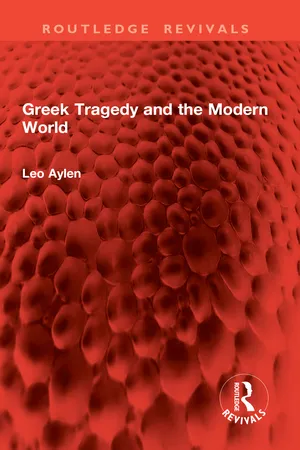
- 386 pages
- English
- ePUB (mobile friendly)
- Available on iOS & Android
Greek Tragedy and the Modern World
About this book
First published in 1964, Greek Tragedy and the Modern World begins with the question what is Tragedy? Most discussion assumes some essence of Tragedy in certain plays at certain periods, and discussion today centres on whether it is possible, or desirable, for contemporary plays to attend to this essence. There is considerable agreement about what this essence of Tragedy is. But when we examine closely the works of Aeschylus, Sophocles and Euripides we find that none of the important aspects of this essence of Tragedy applied to them. Greek tragedies are not Tragedy. Yet if we read or perform them, we do discover a special attitude to life which they present.
By examining each of the works of the three Greek masters in turn the author has tried to define what this attitude to life consists of. He then turns his attention to dramatists who have attempted with varying degrees of success, to present aspects of this attitude in contemporary terms: Buchner, Ibsen, Strindberg, Miller, Cocteau, Gide, Giraudoux, Anouilh, Sartre, Ghéon and Eliot. He pays particular attention to such key concepts as 'myth' and discusses the various forms of poetic language used by these writers. The author assumes that one cannot criticise literature, still less drama, except in terms of a complete view of life and goes on to examine the claims of different philosophical systems and methods to provide this. He believes that such a view is both possible and desirable in our time and indeed a necessary prerequisite for the emergence of modern tragedy. This is a must read for scholars and researchers of Greek literature, theatre studies and literature in general.
Frequently asked questions
- Essential is ideal for learners and professionals who enjoy exploring a wide range of subjects. Access the Essential Library with 800,000+ trusted titles and best-sellers across business, personal growth, and the humanities. Includes unlimited reading time and Standard Read Aloud voice.
- Complete: Perfect for advanced learners and researchers needing full, unrestricted access. Unlock 1.4M+ books across hundreds of subjects, including academic and specialized titles. The Complete Plan also includes advanced features like Premium Read Aloud and Research Assistant.
Please note we cannot support devices running on iOS 13 and Android 7 or earlier. Learn more about using the app.
Information
Table of contents
- Cover
- Half Title
- Title Page
- Copyright Page
- Original Title Page
- Dedication
- Original Copyright Page
- Table of Contents
- Preface
- Introduction
- Part I: Greek Tragedy
- Part II: The Possibility of Modern Tragedy
- Part III: Modern Tragic Writing
- Notes
- Appendix
- Bibliography
- Critical Bibliography
- Index